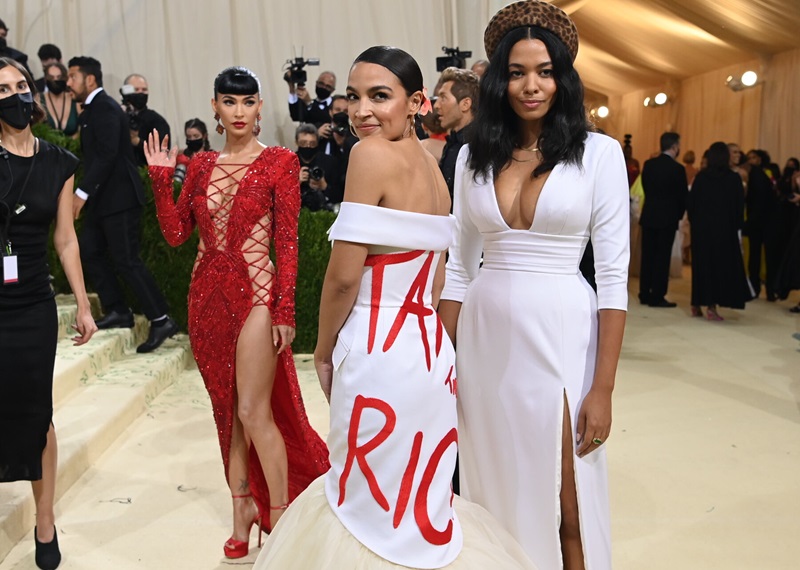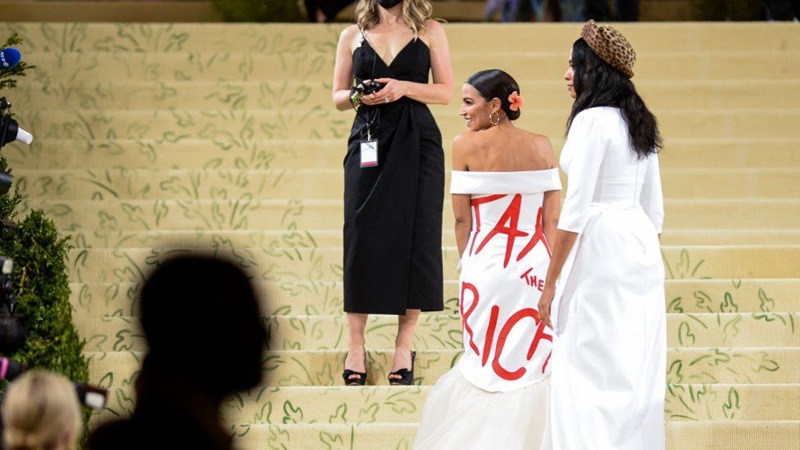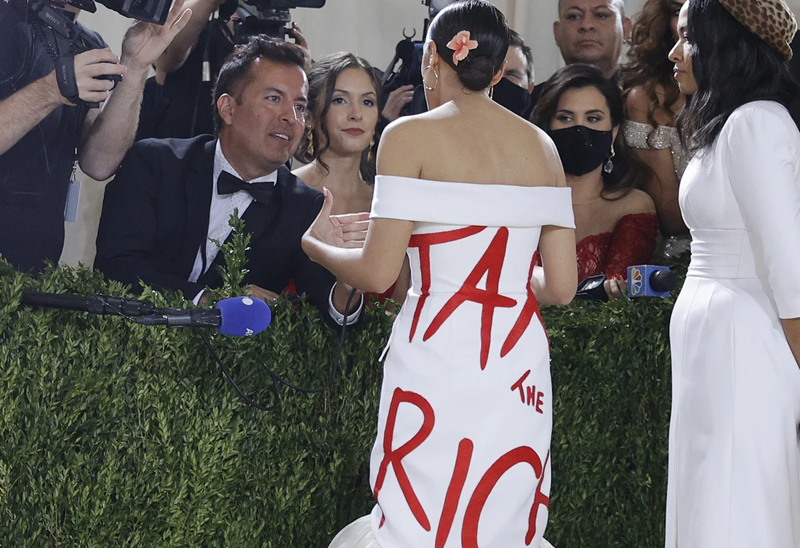The recent appearance of Alexandria Ocasio-Cortez (AOC), the U.S. Representative for New York’s 14th congressional district, at the Met Gala 2021, has stirred up a controversy and is currently under scrutiny. The main cause for the hullabaloo is the white gown she donned, which bore the slogan “Tax The Rich” in bold red letters.
Critics argue that her attendance at the prestigious event, known for its high ticket prices, contradicted the statement emblazoned on her dress. However, it is also worth noting that AOC defended her choice, expressing the importance of having working-class representatives present at such events. Nevertheless, the incident has led to an investigation being launched into whether her actions breached any ethical standards.
The House Ethics Committee is now probing the matter, to ascertain if any violations were made with regards to the acceptance of the gala ticket, which is allegedly worth thousands of dollars. The question of whether AOC paid for the ticket herself or if it was gifted to her has become a subject of debate. If the latter is found to be true, it may be a breach of the rules, which prohibit accepting gifts of substantial value. However, there are exceptions to these rules for widely attended events, and it is still uncertain if the Met Gala falls under that category.
AOC’s choice of attire was designed by Brother Vellies, a brand known for its commitment to sustainability and ethical fashion. The designer, Aurora James, defended the congresswoman, stating that the dress was meant to spark a conversation about wealth inequality in the U.S. The use of the phrase “Tax The Rich” on such a public platform is a clear reflection of AOC’s political stance and her advocacy for economic justice.
Notwithstanding the debate, many supporters of AOC praise her audacity in bringing political discourse to an event typically associated with fashion and celebrity culture. They argue that her appearance at the gala, and the message on her dress, highlights the tax disparities in the U.S. and brings attention to wealth inequality in a way that is difficult to ignore.
However, others deem her actions hypocritical, pointing out the irony of her message at an event where attendees are largely wealthy individuals. Detractors argue that the congresswoman’s message could have been delivered at a more appropriate venue, and not at a high-profile event known for its ostentatious display of wealth.
The ongoing investigation has placed AOC’s actions under a microscope, provoking discussions and debates about the ethics of politicians attending high-profile events, the implications of accepting gifts, and the intersection of fashion and politics. While the outcome of the investigation remains to be seen, it undeniably underscores the influence of politicians in shaping public discourse, as well as the power of fashion as a medium for expressing political and social views. As such, the controversy surrounding AOC’s Met Gala appearance serves as a potent reminder of the intertwining of politics, fashion, and ethics in contemporary society.

The Controversial Met Gala Dress
The Met Gala, known for its annual parade of glittering celebrity fashion, has always been a platform for controversial style statements, and one dress in particular sparked a heated debate. The centerpiece of this controversy was a colorfully embroidered dress that bore a politically charged message. This attire, worn by a notable congresswoman, boldly carried an economic policy slogan across its voluminous red taffeta train, an unusual sight amidst the extravagant gowns and tuxedos.
The audacity of the message, coupled with the grandeur of the event, ignited a whirlwind of diverse opinions. Critics argued that it was an inappropriate venue to bring politics into, while others hailed it as a powerful expression of free speech and a clever use of the spotlight to draw attention to important societal issues. The dress was seen as a symbol, an embodiment of the wearer’s political beliefs and a statement of intent. It was perceived by some as a brave stand against economic inequality, while others viewed it as a calculated publicity stunt, a critique of the capitalist system using the very trappings of luxury and excess.
The controversy around this Met Gala dress reflects the increasingly blurred lines between fashion, politics, and social commentary. It shows that the red carpet is not just about showcasing couture, but also a stage on which celebrities can influence public discourse. Regardless of the myriad opinions that emerged, the incident indisputably demonstrated the power of fashion as a medium to communicate, provoke, and even polarize. This Met Gala dress, in all its controversy, served as a reminder that fashion is never just about the clothes; it’s about the message they carry and the reactions they evoke.
Investigation Details
An investigation is a detailed inquiry or systematic examination aimed at discovering the truth about a situation or event. These inquiries often involve a multitude of processes including the collection of evidence, interviewing witnesses, and analyzing data. The details of an investigation are crucial in establishing a comprehensive understanding of the incident in question, and they can often determine the outcome of the investigation itself.
The specifics can include the physical location where the incident occurred, the individuals present, the chronology of events, and any physical or digital evidence obtained. Investigators are trained to meticulously gather, record, and interpret these details to ensure that they provide the most accurate and complete narrative possible. This process requires a high level of skill, precision, and patience as investigators must sift through a myriad of information, some of which may be conflicting or misleading.
With the assistance of technological advancements and scientific methods, the accuracy and speed of investigations have improved significantly. However, the human element remains vital in the interpretation and understanding of these details. The investigator must use their knowledge, experience, and instinct to discern the relevance and truthfulness of the information they obtain.
As such, the details of an investigation are not just mere facts, but they are pieces of a complex puzzle that, when put together correctly, reveal the truth about an event or situation. Therefore, the meticulous collection and interpretation of these details are essential in ensuring the credibility and effectiveness of any investigation.

Public and Political Reactions
Public and political reactions are a significant component of societal discourse, reflecting the sentiments of a community or nation towards current events, policies, activities, and decisions. They serve as an indicator of public sentiment and political perspectives, often eliciting changes in governing strategies and shaping future policies.
The public reaction is typically a collective response from a group of individuals or communities, expressed through various mediums such as social media, protests, or opinion polls. This response often represents the diverse and multifaceted views of the populace, ranging from satisfaction to outright dissatisfaction with the status of affairs. Moreover, public reactions can drive societal change, as seen in movements that have led to significant societal transformations.
On the other hand, political reactions often stem from policy makers, government officials, and politicians. These reactions are typically influenced by ideological leanings, party affiliations, and the desire to maintain or gain power. They are expressed through public statements, legislative proposals, and voting patterns. Unlike public reactions which are diverse and often spontaneous, political reactions are usually more strategic and calculated, aimed at garnering support or countering opposition.
The interplay between public and political reactions is a dynamic process that can shape societal norms and influence policy development. While political reactions can sway public opinion, strong public reactions can also compel politicians to reassess their positions. This ongoing dialogue between the public and the political realm is a vital aspect of participatory democracy, ensuring that the voices of the populace are considered in decision-making processes.
Understanding these reactions and their implications is critical for anyone seeking to comprehend the socio-political landscape of a given society. They provide insight into societal values, political climates, and potential future directions, making them an essential tool for political analysis and prediction.

Implications for Future Political Statements
Future political statements carry significant implications in both domestic and international arenas, given their potential to shape public opinion, policy direction, and alliances. In the realm of domestic politics, such statements can influence how citizens perceive and engage with their government, potentially swaying voting behaviors and civic participation. In an era marked by increasing polarization, these statements, particularly when they are divisive or inflammatory, can exacerbate social fragmentation and mistrust.
Conversely, thoughtful and balanced political rhetoric can foster a more informed and engaged citizenry, facilitating constructive dialogue and compromise. On the international stage, future political statements can have profound implications for diplomatic relationships, trade agreements, and conflict resolution efforts. In an increasingly interconnected world, the words of political leaders can either promote cooperation and mutual understanding or fuel tensions and misunderstandings.
Moreover, the rise of digital media adds another layer of complexity to the implications of future political statements. The speed and reach of online platforms mean that the effects of political statements are amplified and accelerated. This can lead to rapid shifts in public sentiment, with potentially destabilizing effects on both national and global scales.
Additionally, the increasing prevalence of misinformation and disinformation online complicates the landscape further. It underscores the need for political leaders to exercise caution and responsibility in their communications, recognizing the potential for their words to be distorted or misinterpreted. In conclusion, future political statements hold tremendous power and potential, carrying far-reaching implications for democratic governance, international relations, and the digital information environment. Therefore, they must be made with care, clarity, and a deep understanding of their potential impacts.
